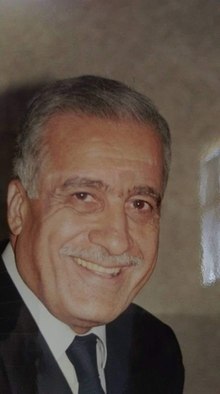Mohammed Nasif Kheirbek (Arabic: محمد ناصيف خيربك, 10 April 1937 – 28 June 2015) known as Mohammed Nasif or Abu Wael,[1] was the former Deputy Vice-President for Security Affairs in Syria.[2] He was a close adviser of Syrian President Bashar al-Assad and served as Syria's point-man for its relationship with Iran and Lebanon's Shia militias.[3] Nasif was among several officials sanctioned by the European Union for the use of violence against civilians during the Syrian civil war.[2]
Mohammed Nasif Kheirbek | |
|---|---|
محمد ناصيف خيربك | |
 | |
| Deputy Vice President for Security Affairs | |
| In office 2005 – 28 June 2015 | |
| President | Bashar al-Assad |
| Prime Minister | Riyad Farid Hijab Wael Nader al-Halqi |
| Succeeded by | Ali Mamlouk |
| Deputy Director of the General Security Directorate | |
| In office 1999–2005 | |
| Succeeded by | Hassan Khallouf |
| Head of the Internal Branch (251), General Intelligence Directorate | |
| In office 1963–1999 | |
| Preceded by | Position established |
| Succeeded by | Bahjat Suleiman |
| Personal details | |
| Born | 10 April 1937 Hama, First Syrian Republic |
| Died | 28 June 2015 (aged 78) Damascus, Syria |
| Political party | Ba'ath Party |
| Nickname | Abu Wael |
| Military service | |
| Allegiance | |
| Branch/service | Syrian Arab Army |
| Years of service | 1957–1999 |
| Rank | |
| Unit | Infantry Military Intelligence |
Background
editMohammed Nasif Kheirbek was born 10 April 1937 in Homs but his family was from the Alawite village of al-Laqbah near Masyaf.[4] He was a member of the Alawi Kalabiya tribe, to which Bashar al-Assad belongs.[5] The Kheirbek and Assad family are also connected by marriage. His brother Mu'ein is married to one of Rifaat al-Assad's daughters, Tumadhir. Mohammed was the head of the powerful Kheirbek clan who are represented throughout the Ba'ath Party and the Syrian security apparatuses.
Career
editKheirbek was a very close adviser to the late Syrian President Hafez al-Assad. He was the military attache in East Germany between 1971 and 1975. In the 1990s he was a central figure in relations with Iran and Lebanese Shiite militias.[6][7] In 1999, he was appointed the deputy director of the General Security Directorate and then in 2005 became the deputy vice-president for security affairs. Two years later, the US froze his assets for contributing to the government of Syria's problematic behavior, which included support of international terrorism, the pursuit of weapons of mass destruction, and the undermining of efforts in Iraq.[5] He was also reported in 2007 to be in charge of Syria's Lebanon portfolio.[citation needed]
Syrian Civil War
editIn May 2011, Kheirbek was sanctioned by the European Union for the use of violence against protesters participating in the Syrian civil war.[2] The following month, he reportedly traveled to Iran to meet General Qasem Soleimani, the commander of the Quds Force, a division of the Iranian Islamic Revolutionary Guard Corps (IRGC), which conducts special operations outside Iran. They reportedly discussed creating a supply route that would allow Iran to transfer military equipment directly to Syria by way of a new military compound at Latakia airport.[5]
Personal life
editKheirbek got married at an old age and had an only son called Wael.[1]
References
edit- ^ a b زياد حيدر. "زياد حيدر: رحيل رجل أمن سورية الأكبر محمد ناصيف "أبو وائل" :: عربي ودولي – جريدة السفير". جريدة السفير.
- ^ a b c "Joint Proposal for a COUNCIL REGULATION concerning restrictive measures in view of the situation in Syria and repealing Regulation (EU) No 442/2011". EuroLex. 52011PC0887. 2011. Retrieved 10 March 2012.
- ^ Black, Ian (28 April 2011). "Six Syrians who helped Bashar al-Assad keep iron grip after father's death". Guardian. Retrieved 19 August 2012.
- ^ Rosen, Nir. Assad's Alawites: An entrenched community. Al Jazeera English. 2011-10-12.
- ^ a b c "Bashar al-Assad's inner circle". BBC News. 30 July 2012. Retrieved 19 August 2012.
- ^ MEIB (July 2000). "Syria's Intelligence Services: A Primer". Middle East Intelligence Bulletin. 2 (6). Retrieved 8 June 2011.
- ^ Bar, Shmuel (2006). "Bashar's Syria: The Regime and its Strategic Worldview" (PDF). Comparative Strategy. 25 (5): 425. doi:10.1080/01495930601105412. S2CID 154739379. Retrieved 15 May 2011.